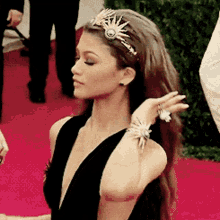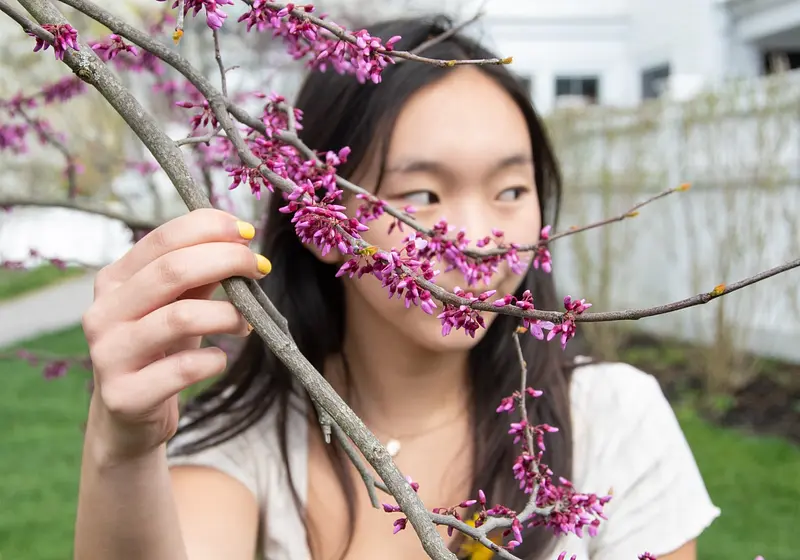Growing up, I was raised by my Nai Nai, my grandmother on my dad's side. She taught me my first words, sang me my first songs, and took countless walks with me in Central Park. Nai Nai has always been the strongest person I know.
She taught me that love comes in different forms, at different times, but always easily from the ones who stay. She showed me I am worthy of love.
I've learned from her that love can be learned through caring for flowers. My dad always brings home flowers for no occasion. He would arrange the tulips, daisies, and peonies with thoughtful care.
We appreciated the nuances: the way the petals creased over time like the corners of my eyes, the impermanence of the rose’s delicate beauty, and the gradient hues of the sunflowers. I learned that life was all about balance.


We moved to Boston when I was four years old. We moved into a greenhouse with a backyard that felt like my very own personal Central Park. I got my room, on the same floor as my sister and parents, Nai Nai’s room was right above me, painted robin’s egg blue, close enough that I could reach her whenever I needed.
She was always kind when I couldn’t sleep at night, and let me sleep in her room. Just the warmth of her presence soothed me to sleep. I remember, at age six, the first time I’d had to call my dad on my own. I could barely reach the counter where the landline was, and once I did, my hands trembled as I pressed each number my dad had forced me to memorize and hit enter. My Nai Nai had run into the streets that day, her eyes clouded up, and my nanny had run after her and frantically told us to call our dad. His voice changed as soon as I told him, in tears, and he took a taxi to look for her that day.
A couple of weeks after that day, everything changed. My parents sat me down to talk with me and told me that my Nai Nai had Alzheimer’s. I didn’t know what it meant then, but I was old enough to understand that I could no longer crawl into her bed whenever I needed comfort and that she would be moved into a nursing home that always smelled faintly of urine, a smell I would familiarize myself with so much that I no longer noticed it after a couple of years. I hated my father for telling me, and my heart ached to see her skills dwindling, her mind fading away from me and my family.
I visited as much as I could. I went every weekend with my dad, hoping to catch her on a good day. When she could still speak, we would have conversations, but she was always bitter about the people around her.
When she could still walk, we’d take long strolls in the park, admiring the flushed red leaves, or the cool summer breeze or blossoming tulips. When she could still eat, we’d go out every year to a soba restaurant for her birthday, and sing to her and eat long-life noodles for her health. Soon, she could no longer speak, walk, or eat. She couldn’t even remember the face of her granddaughter.

At the age of eight, I wore purple flowers in my hair for Alzheimer’s awareness. I learned how to do things that no other eight-year-olds knew, how to crush pills into the insides of Nutter Butter cookies, where to buy Febreze, how to persuade Nai Nai into the shower and cut her hair.
I knew how to get rid of the stains on the couch when another resident, Don, would sneak in and sleep and then wet himself on Nai Nai’s couch. And I knew how to cry, just quietly enough that it would barely make a sound.
I learned that her nursing home was never a permanent home for anyone. It was like a gas station, a quick stop before the graveyard. I learned that when people left, they were never coming back.
When I stopped seeing Margie, who talked to me of her young love and showed me pictures of her children, she had moved on. To a better place, they told me. I thought any place would be better than these ironically bright walls, matching the creamsicle-colored prescription bottles, and the skeletons of people who couldn’t recognize the faces of their family or friends.
I grew sick of learning and sick of feeling. I wanted nothing other than to watch as my Nai Nai could no longer do anything that a basic human would. I pushed her into her wheelchair and spooned mashed peas into her mouth patiently when she could no longer eat food that wasn’t pre-pureed.
I went through photobooks of who she used to be, wondering what the story was behind the expression on her face in her wedding photo, a beautiful young woman, with a future still ahead of her. Her eyes crinkled up just like mine. It soothed me to learn that I shared her eyes.


In Mandarin, the term, xiao shun means learning to respect and take care of those who have taken care of you. My family taught me the most valuable lesson: the most precious moment of a flower is not when it is in full bloom, but when it is sitting still dried up in a purple vase.
It is not the ephemeral beauty that matters, but how we preserve it. In life, there is as much to be gained from nurturing something to bloom as there is in caring for it while it is wilting.

















